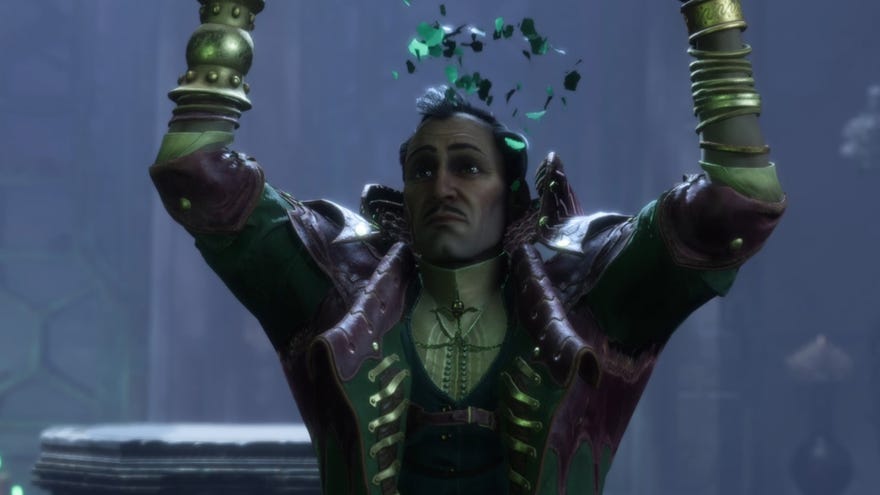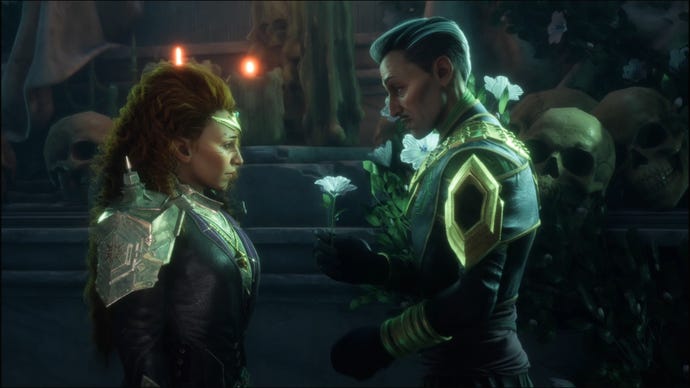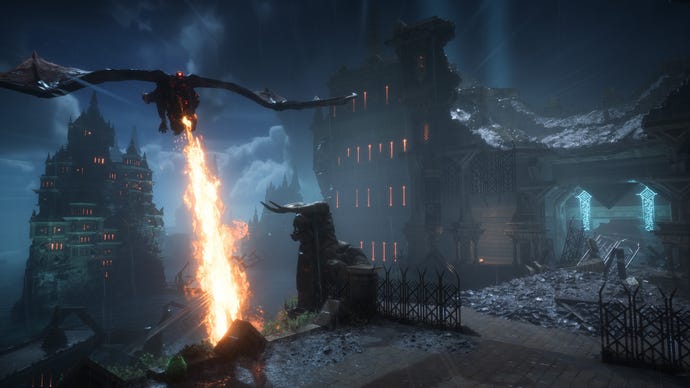HomeFeaturesDragon Age: The Veilguard
Baldur’s Gate 3’s reactivity didn’t ruin Veilguard’s linearity for me - it let me enjoy it moreBranching paths
Branching paths
Image credit:Rock Paper Shotgun/Electronic Arts
Image credit:Rock Paper Shotgun/Electronic Arts

Minor spoilers for the first few hours of Veilguard and heavy spoilers for Baldur’s Gate 3
For all the things Iended up enjoyingaboutDragon Age: The Veilguard, it isn’t much of anRPG. What little roleplaying it does offer revolves around what flavour of supportive hero you prefer, and you can count the number of impactful dialogue decisions on a three-fingered hand. This might sound utterly damning in the wake ofBaldur’s Gate 3’s incredible reactivity, and if I approached games as some sort of tedious comparative intellectual exercise rather than just, y’know, seeing how I felt about them, then I suppose it would be. Weirdly, though, the recent memory of Baldur’s Gate 3 didn’t diminish my time with Veilguard at all. It was actually the opposite: it freedDragon Agefrom having to carry the torch for a certain period in Bioware’s history, and let me enjoy Veilguard for what it was.
To clear this up before getting into it: I’m not saying we shouldn’t ask for better from games, nor lower our standards. There’s a theoretical version of Veilguard that stuck with a more cohesive vision from the start, didn’t have to weather publisher meddling or key talent bleeding from Bioware, and ended up a much more confident and robust RPG. The version of Veilguard we got feels compromised; the product of a messy development cycle fraught with shifting priorities, and full of trends and tonal choices that haven’t aged especially well in the time since that cycle begun.
Dragon Age: The Veilguard | Official Launch TrailerWatch on YouTube
Dragon Age: The Veilguard | Official Launch Trailer

That all said, Veilguard also did a lot of things I liked, and I was happy to forgive a lot of things I didn’t because Baldur’s Gate 3 had already provided those things with gusto. “Oi! Are you saying I should enjoy bad games because other, better games exist?” Nope! Stop extrapolating specific experiences into general ones! That’s not how art works! Anyone who tells you differently has GenAI stock.
So, Veilguard. One of the points I made early in my review is this: Rook’s a boy scout, and there’s no way around that. There’s an early choice that has you decide whether to leave a mayor to die for selling his town out to the bad elf gods. If you’re a Grey Warden, you can also send him off to fight Darkspawn. It’s such a classic Dragon Age choice in a game almost entirely absent of them that I’m certain it’s a remnant for an earlier build. From here on out, Veilguard constricts, funneling down a linear tunnel both its overarching story and the conversations that Rook can hold with their companions.
Image credit:Rock Paper Shotgun/Electronic Arts

But I also found that Veilguard’s linearity does work for it in certain ways, letting it do things that might not be ‘better,’ but maybe feel more successful in terms of what it’s trying to offer. While Larian’s writing is much stronger in terms of characters and dialogue, I actually felt the overall plot fumbled quite spectacularly toward the latter third. I’ve replayedBaldur’s GateII: Shadows Of Amn several times, and so the memory of how intimidating, eldritch, and unknowable-feeling the Mind Flayers in the sewers are clashed pretty strongly with the spectacularly goofy “what if there was a good Mindflayer who talked and you could also bone?” bit, which shattered my suspension of disbelief so hard it never recovered. There are parts within BG3’s finale I like, but I think it shows how - even with such good writing - it’s supremely difficult to pull a satisfying ending with so many variables.
Image credit:Rock Paper Shotgun/Electronic Arts

That modern Bioware are no longer the best example of custodians of their own legacy is disappointing. I can, to some extent, understand how Veilguard is emblematic of something justifiably missed, and so has become somewhat of a sin eater.Anthemis almost exempt from being quite as disappointing, since it didn’t even try to recreate the things so many love about Bioware’s heyday. But I’ll take what I feel is an honest attempt with flaws over something cynical. To me, Veilguard isn’t a return to form - but it does suggest that Bioware understand what made that form special, and could return to it, time and circumstance allowing. Until then, as Larian’spublishing head put it, it’s no bad thing to have some Netflix to switch off to in the downtime between seasons of prestige telly - even if I’d feel a lot less charitable if Netflix is all we had.